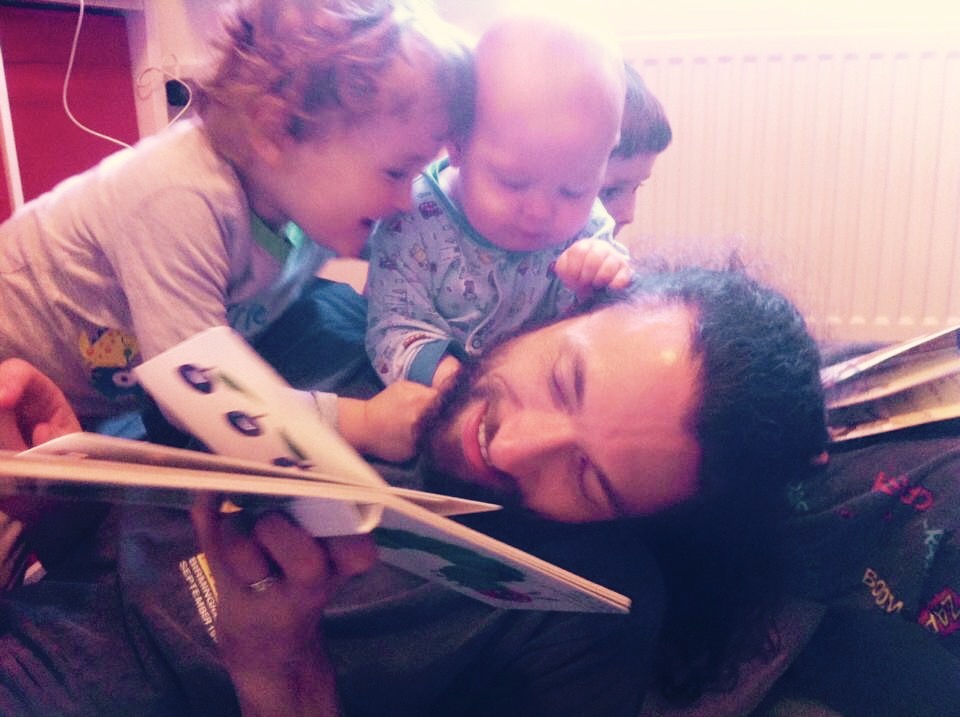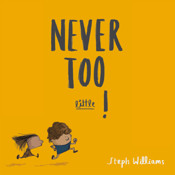
Telling Bible stories to children, at home or in church, is often a challenge. A younger sibling may be trying to eat the book, or poke someone in the eye. In toddler groups, someone is inevitably standing right in front of the book or making off with a visual aid. It’s not always easy to hold attention or make the story meaningful.

Steph's husband attempting a bedtime story with three energetic boys. Point proven!
Having seen how my own children responded in church groups and at home, and having faced a terrifying crowd of toddlers quite a few times in our midweek toddler group, I believe there are three questions we should all be asking when telling Bible stories.
We’ve all been there – you can easily spend two weeks sourcing an impressive visual aid for the toddler group or Sunday school, but just a quick two minutes is given to checking the passage itself. It’s Noah or Jonah, we’ve probably read the board book seven times this month already. We all know the story. Do we even need to open the Bible?
And yet, if you were preaching a sermon, you wouldn’t prepare the same way. So why do we feel it is important to correctly understand what the Bible says for big people, but perhaps less so for little ones? Of course, the message to children needs to be communicated in simple terms, but it doesn’t follow that our understanding of the Bible needs to be more simple or superficial. I’ve been surprised how easily I’ve held my own mis-assumptions about what a Bible story is all about until I read the passage carefully.
In fact, I would argue it takes more work in understanding the passage, the simpler you need to make it. In writing the Little me, Big God series I found that to translate these passages for young children I needed to know precisely what the words meant.
For example, when Jesus says in Mark 10:14 'the kingdom of God belongs to such as these’ we need to reword this whole phrase. So what does it mean for 'the kingdom of heaven’ to ‘belong’ to someone if God is the king? In the gospels ‘inheriting the kingdom of God’ is about enjoying the blessings of God’s reign (the phrase is used in the beatitudes). Such ‘blessings’ would be good instead of evil, comfort and provision for all our needs, acceptance and friendship with God—the things we most need as humans. Yet the word ‘blessing' would not capture that for a child, who doesn’t use it often and may not have any idea what it means How can we describe this appropriately and accurately to the Bible? We need to put the work in here.

An engaging retelling of little children coming to Jesus from Mark 10 v 13-16
A common mistake is to make a Bible story (or explaining it) too long and complicated, rather than too simple. My experience is that one or two sentences per image is right for most pre-schoolers – and many older ones too. Sometimes we tell the story and then shove a 2 line gospel explanation in at the end: ‘So … (deep breath) we’ve all sinned and done wrong things that make God sad and angry, but Jesus died to take away our punishment, so if we trust in him we can be friends with him, now and in heaven, and we need to do the things he wants us to do in our lives, just like X in the story’. Not many children would take it in. It is worth asking how many concepts you want to try and communicate in your bedtime bible story or toddler group – one may be enough. It’s better to get one across clearly, than to rush and confuse three.
We always found it interesting asking our children what happened in the Bible story in Sunday school. Until the age of about 6 we found that key details were quite often seriously confused or inverted! I tried to find a way to ask them what the main application was—what they learnt about God, or something they needed to do—but they always claimed nothing was said about this. I’m sure that was not true. There were times, however, when they did seem to have taken things in, even at a young age and that was lovely to see.
We need to use clear emphasis and repetition—children take in less than we think. You could try using a repeated question, from week to week, such as ‘What does this story teach us about God?’ or ‘Is there someone we should copy/not copy in this story?’. Repeat this question in different ways, written and oral, illustrated through a game, or with a visual aid, to remind them.
I’d love to see churches thinking more about helping young children really engage with Bible stories. If we get these three things right I think we’ll be going a long way to doing it well.
The Little me, Big God books are a series of simple, age appropriate Bible stories to engage real toddlers with God's Word. Children will learn to listen to Jesus from the accounts of blind Bartimaeus (Mark 10:46-52) and Mary and Martha (Luke 10:38-42). They will also learn that they are never too little to come to Jesus (Mark 10:13-16). Find out more.
.jpg)